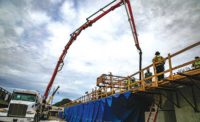Design and construction organizations are lobbying to get a proposed tax increase for certain professional-services firms—including architecture and engineering firms—stripped from a bill now pending in the Senate. But the groups face hurdles.
The American Council of Engineering Cos., American Institute of Architects, American Subcontractors Association, Associated Builders and Contractors, Associated General Contractors and other business groups are backing an amendment proposed by Sen. Olympia Snowe (R-Maine) to drop the tax hike from the American Jobs and Closing Tax Loopholes Act, which the Senate is debating.
The Snowe proposal is one of a string of pending amendments to the bill.
Drafters of the tax provision view it as one of the loophole-closers to which the bill’s title refers. The proposal would require certain small, professional-services firms organized as “S-corporations” to pay Social Security and Medicare payroll taxes. Among the types of firms specifically cited in the bill are engineering and architecture companies.
To its advocates, another plus is that the provision would raise an estimated $11.2 billion over 10 years, partly offsetting the costs of a package of tax-break extensions that also are in the bill. Construction interests support some of those breaks, such as accelerated depreciation for upgrades to restaurants and leaseholds.
In a June 11 letter, opponents of the S-corporation provision told Senate Finance Committee Chairman Max Baucus (D-Mont.) and the committee’s top Republican, Charles Grassley (Iowa), that if the provision is enacted, it “will overturn more than 50 years of tax policy.”
They also argue that the provision “would hurt job creation” and that it “appears to be unenforceable.” The proposal would affect firms whose “principal asset ... is the reputation and skill of three or fewer employees.” The organizations told Baucus and Grassley, “The enforcement challenges accompanying this new test and the valuations of intangible assets are too numerous to list.”
They add that the Internal Revenue Service “currently uses a ‘reasonable compensation’ test to ensure S-corporation shareholders pay the correct amount of tax. Replacing this established test with a ‘principal asset’ test is a step backward for tax enforcement and should be rejected by the Senate.”
Opponents have a tough road ahead, however. For one thing, if the S-corporation provision is dropped, it would leave an $11.2-billion hole for senators to fill with some other revenue-raising tax hike. In addition, Snowe had only two initial co-sponsors for her amendment, Mike Enzi (Wyo.) and John Ensign (Nev.), both Republicans.
But even if the construction groups and other foes of the S-corporation provision succeed in knocking it out of the Senate bill, they would face another fight. The House passed its version of the tax bill on May 28 and included the S-corporation language. It would be up to a House-Senate conference committee to determine whether it would survive in the final version of the legislation.



